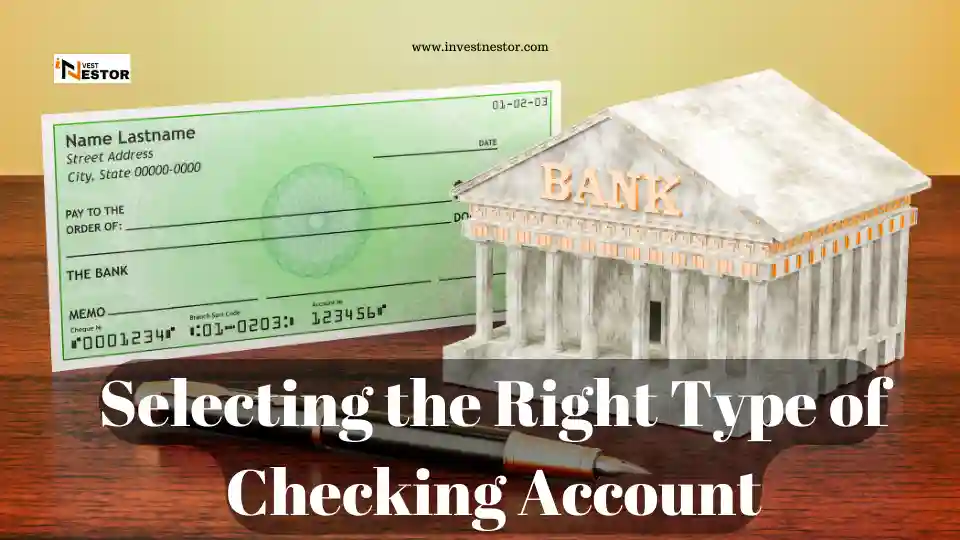
5 Different Types of Bank Accounts - Choose the Best
Our financial needs are different, and so are our financial goals. To meet our specific financial needs, we must choose a bank account specifically designed to meet our needs. So, if you are wondering which bank account is best for you, look at this guide that will help you maximise your return from your bank, minimise fees, and manage all your money in one place.
Different Types of Bank Accounts
- Saving accounts
- Checking accounts
- Money market accounts
- Certificates of deposit
- Retirement accounts
1. Saving accounts
If you want to earmark funds for future needs, savings accounts are best as they help accumulate interest, which ultimately helps your money grow. A savings account is the first official bank account anyone has. It can help you serve different purposes, like stashing cash that you have earned doing your job or doing some household chores.
Saving accounts are the first place where you learn about managing your finances.
It is an excellent place to keep your cash for your financial goals or even meet emergencies that are kept separately from other money you have put for expenses.
-
Positives of having a savings account: A savings account is often the first bank account for kids, teens, or those who want to earn interest on their money.
-
Negatives of saving accounts: Saving accounts offer lower interest rates than money market accounts or certificates of deposits. When you open a savings account, you are offered a debit card for making purchases. When you use this debit card, you pay to withdraw your money from your account.
Saving account tips
If you find banks or credit unions too expensive to open a savings account, you can go online, where online savings accounts often pay higher interest rates and lower fees.Add lump sum cash or set automatic monthly deposits to build your savings account.
2. Checking Account
Checking accounts are mainly used for our everyday spending. These accounts are linked to a debit card so that you can purchase or make ATM withdrawals. You can even deposit cash, make checks, or pay bills in checking accounts. Traditional checking accounts do not offer interest rates; however, if you get an interest-bearing checking account, then you get an opportunity to earn interest, which is offered on saving accounts in the first place.
Checking accounts is the best option if you want to accumulate cash for the short term, as it offers the flexibility to manage your monthly cash flow.
-
Positives of a checking account: A checking account is good for people who want to deposit a paycheck or cash or make payments but have a small balance in their account.
-
Negatives of having a checking account: Traditional checking accounts do not offer interest rates and often charge fees. They also require you to maintain a monthly balance, which can be expensive if your monthly cash flow is limited.
Checking account tips
-
It is good to balance your checking account every month to avoid extra fees.
-
You can set up direct deposit into your checking account. You can use mobile deposit to make direct deposits to your checking account or visit your bank branch.
-
A credit card can sometimes be expensive and requires more safety to handle it. If you are a newbie in managing your finances, then you better go for checking accounts.
3. Money Market Accounts
Money market accounts are similar to savings and checking accounts as they offer the combined features of these two accounts. Money market accounts provide limited check writing privileges and give interest at higher rates than savings or checking accounts. This exceptional feature makes a money market account useful Short-term and long-term needs.
If you have high balances in your account and want to earn more interest rates, money market accounts are a good place to park your cash.
-
Positives of having a money market account: A money market account is a good place to go if you have high balances and want to earn high interest rates.
-
Negatives of having a money market account: Money market accounts require a higher minimum balance than any other bank account. Despite having higher balances in the accounts, the interest rates provided by these accounts are low. Also, they come with limited monthly withdrawals.
Money market account tips
You can use a money market account to accumulate your emergency funds or fulfil your larger financial goals, such as making a down payment for your home or car.
You can even find online-only banks and cash management accounts that are typically low-cost options than money market accounts.
4. Certificate of Deposit
If you want to keep your money for fixed terms like three months or five years, a Certificate of Deposit (CDs) is a good place to keep it untouched for a specified period and gain interest in it. All you need is to be committed to keeping your money in the certificate of deposit for the specified terms, as any early withdrawal can lead to a penalty.
Certificates of deposits are a good way to save for your financial goals, such as buying a house or a car.
- Positives of certificates of deposit: If you have a lump sum amount you don't want to spend, you can lock that amount in a certificate of deposit for the short or long term and earn interest.
- Negatives of certificate of deposit: If you withdraw your funds before the term ends, you may incur a penalty, which may wipe out the interest you have earned.
Certificate of deposit tips
- If you don't want to keep your funds for a longer period, you can set up a CD ladder to receive a portion of your savings promptly.
- If you want to avoid penalties, you can go for banks that offer flexible certificates of deposit that allow you to withdraw your money without penalty.
5. Retirement account
Retirement accounts are specifically designed for individuals who want to keep aside money to use after retirement. Many banks offer individual retirement accounts, but some also provide 401k accounts and another retirement account for small businesses.
Most retirement accounts offer tax advantages. IRAs and 401ks provide tax advantages on your annual growth. However, you will incur income tax based on the type of account you have contributed to.
- Positive of retirement account: For those who want to save a considerable amount for their retirement, retirement accounts are good as they make it easy to save money, which grows larger in the long term.
- Negatives of retirement account: Retirement accounts offer tax benefits, but whether you choose an IRA or 401k, you ultimately pay taxes if you withdraw your funds early.
Retirement account tips
It is good to consult a financial advisor to know how much money you want to save and what type of account you must choose that may help you achieve your retirement goal.
If your company is already offering 401k, then contribute enough to match before you start putting money into another retirement account with your bank.
Bottom Line
When you know the best place to keep your money, you know how to control it. As there are different types of bank accounts, it isn't easy to learn which one is best for you. Before you choose a bank account that fulfils your needs, it is good to know that whichever account you choose will offer you convenience, safety, and security for your money.
FAQs
Which type of bank account gives the most interest?
If you have invested in a retirement account that has invested in different types of stocks and bonds, it might give you more interest in the long term than a CD, money market account, or savings account.
Are bank accounts federally insured?
Not all bank accounts are federally insured. The FDIC only insures money that is deposited at an FDIC-insured Bank. The FDIC-insured banks include checking and saving accounts, money market accounts and certificates of deposits.
What is the difference between a checking and a savings account?
A checking account is used when you want to hold your money for everyday spending. It has no withdrawal restrictions and includes checks and debit cards. However, you earn little interest on your funds in checking accounts. On the other hand, savings accounts provide better interest rates; however, they limit your withdrawals, and if you make too many withdrawals, you might pay extra charges.
Read Also:


 to Your Advantage.webp)



0 Comments
Add a comment